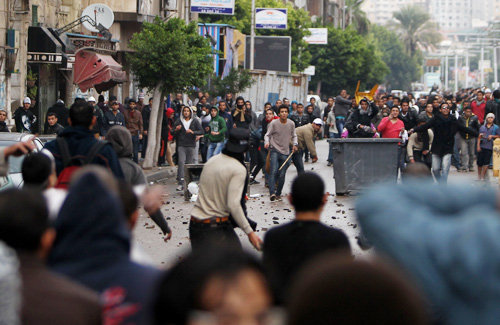|
 |
|
STREET CONFLICT: Supporters and opponents of President Mohamed Morsi clash in the Mediterranean coastal city of Alexandria on December 21, 2012 (XINHUA/AFP) |

Egypt's new constitution was passed in a controversial referendum held in two stages. The constitution is meant to bring stability to Egypt, but the country faces both deep political division and structural problems.
Constitution passed
On November 22, 2012, Egyptian President Mohamed Morsi issued a shock decree granting him a slew of new powers, triggering widespread opposition protests. Egypt again descended into a serious political crisis that began with a series of large street protests in January 2011 that led to the ousting of former President Hosni Mubarak.
To ease the political turmoil and quicken the birth of a new constitution, Morsi decided to hold a constitutional referendum. The voting was conducted in two stages. The first 10 governorates, including Cairo and Alexandria, voted on December 15, with the rest voting on December 22.
The referendum stood a good chance of passage due to several key factors.
Morsi and his Muslim Brotherhood are highly influential in Egypt. For decades, the Muslim Brotherhood, with a strong Islamic religious belief, has established a vast network in urban and rural areas. It runs numerous social and economic organizations across the country, including hospitals, schools, banks, businesses and media outlets. Moreover, the party controls many public organizations like charities, labor unions and volunteer groups. Their activities have had a big influence in many sectors in Egyptian society, building a solid social and economic foundation. Thus, the Muslim Brotherhood became the ruling party by winning a clear majority in a general election in early 2012, with Morsi elected the Egyptian president several months later. The Muslim Brotherhood used that same energy and support to win the referendum.
The opposition is too weak and fragmented to stop Morsi's new constitution. Composed mainly of secular liberals, most opposition members come from the middle and upper classes, accounting for a minority in Egypt. In addition, Morsi is a democratically elected president. His push for a new constitution accorded with the law, and the referendum was the best means of representing the will of the people. Thus, the opposition National Salvation Front lacked the justification to defeat it. Both the National Salvation Front and Egypt's Supreme Judicial Council, which initially vowed to boycott the referendum, changed their minds later. Coptic Christians, who make up about 10 percent of Egypt's 85 million population, although dissatisfied with the constitution's Islamic bent, also took part in the referendum.
Egyptian people want a stable environment and a new charter that removes their concerns. They believed if the new constitution was passed, Egypt would restore peace and order at a time when they were most urgently needed. More than 90 percent of Egyptian people are Muslims. The new charter recognizes the status of Islam in Egyptian society while protecting people's rights, which makes it popular with average Egyptians.
Some people may be concerned that Morsi will gain sweeping powers to control the country. However, the new constitution stipulates the president can be reelected only once, and has no right to dissolve the parliament. The president must fully respect legislative and judicial independence. In addition, all constitutional decrees issued before, including the recent declaration expanding the president's powers, will be abolished when the new constitution becomes effective. All these efforts to restrict presidential powers are helpful to mitigate people's suspicions and anxieties. On December 12, 2012, when the National Salvation Front announced it was abandoning resistance to the referendum, the Egyptian stock market index EGX30 went up 2.8 percent, showing Egyptian people's longing for stability.
|
